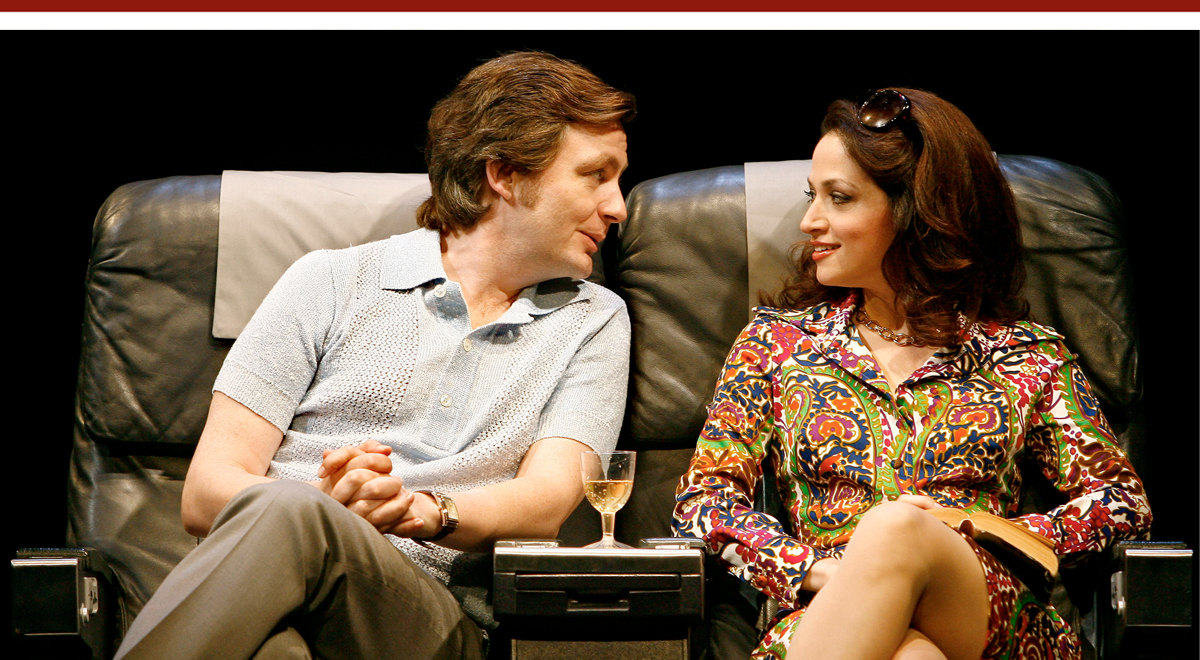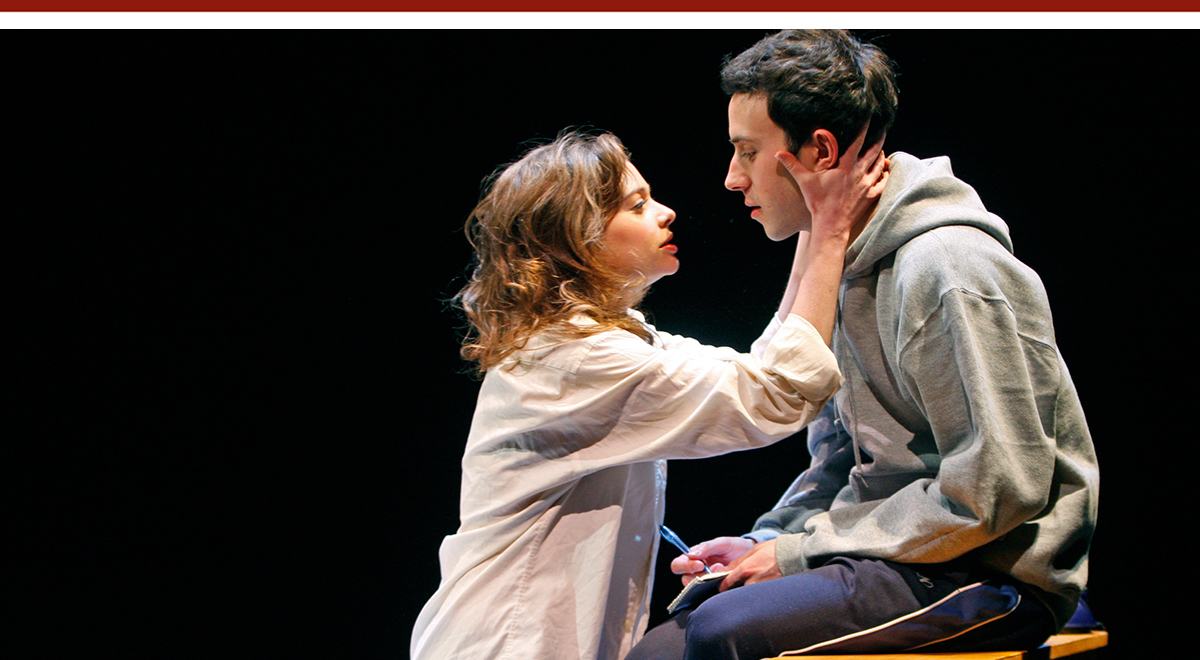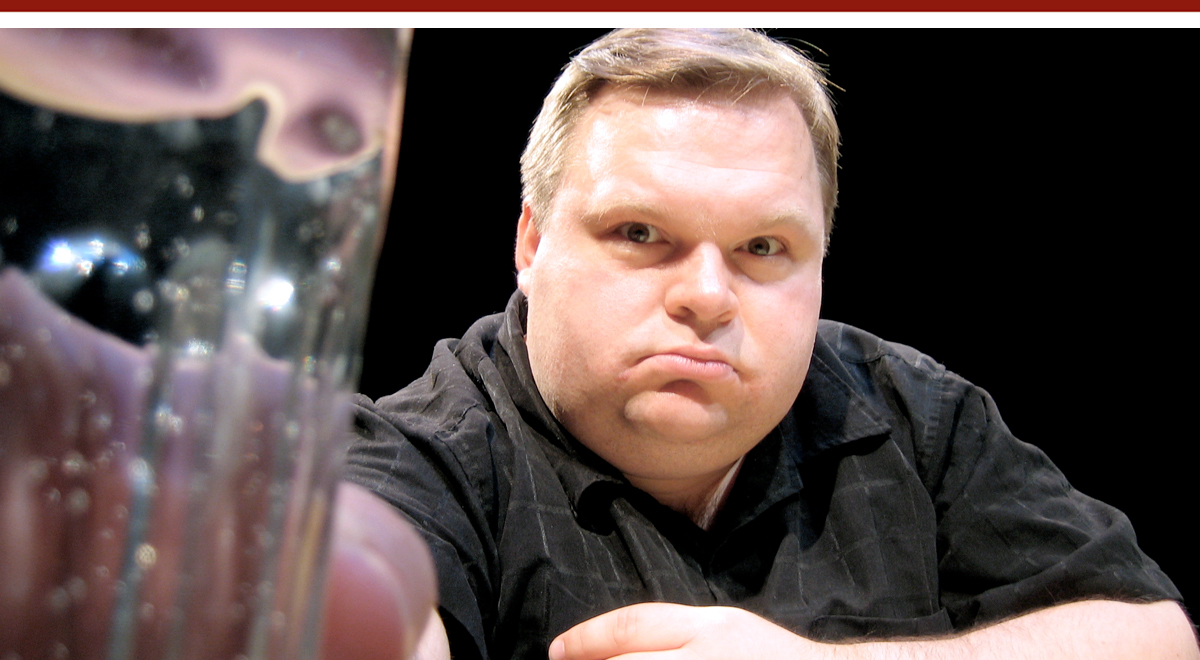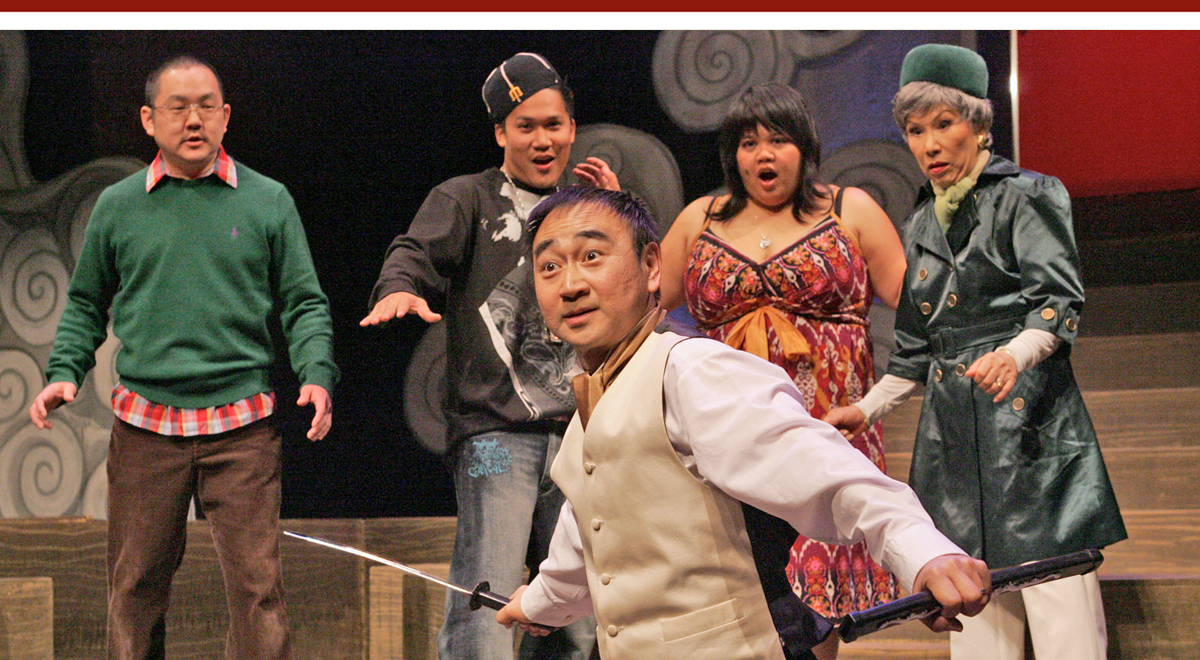MARCH 2009
Click title to jump to review
DARWIN by Ian Carney and Corbin Popp | Kirk Douglas Theatre
FROST/NIXON by Peter Morgan | Ahmanson Theatre
GOLDFISH by John Kolvenbach | South Coast Repertory
HOW THEATER FAILED AMERICA by Mike Daisey | Kirk Douglas Theatre
IXNAY by Paul Kikuchi | East West Players
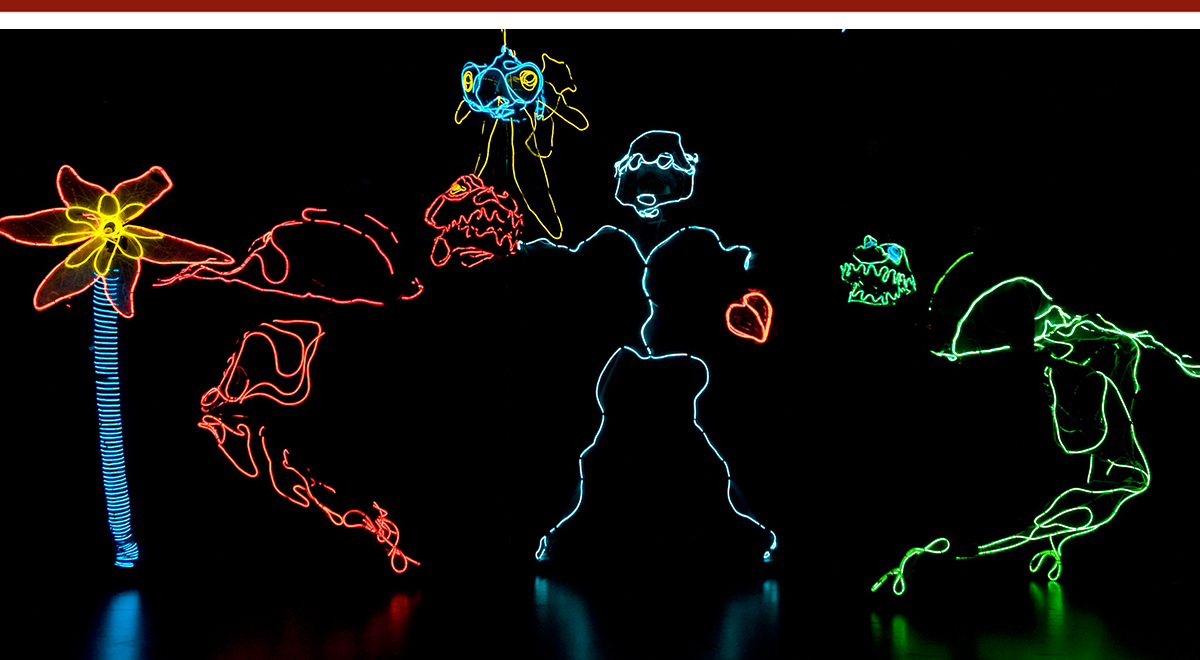
Lighting the Way
Loosening the grip that computer games and other technology-based entertainment have on young attention spans could use some "alternating currency." Recently, Center Theatre Group jolted the effort forward with a P.L.A.Y. production at the Kirk Douglas Theatre entitled Darwin: An Adventure for All Ages. The multi-disciplinary production drew a couple of housefuls of Culver City kids and their handlers. And, true to its claim, it connected with the full span of viewers.
Created, choreographed and directed by Ian Carney and Corbin Popp, Darwin may be light on storytelling, but it is rich in the technologically dazzling visuals that today's kids relish. It also promotes appreciation for puppetry and movement, art forms that resonate best in live performance. However, because the onstage characters appear to be mere light drawings, younger patrons may not appreciate what they are appreciating until the humans reveal themselves at curtain call. With only squiggles of thin, neon piping Darwin creates a menagerie of fantastic figures and sets them into a dark Douglas stage. With a relationship reminiscent of Geppetto and Pinocchio – and images recalling the Main Street Electrical Parade – Darwin tells the story of a good-natured dinosaur discovering the outside world. Assembled and nurtured by a lonely scientist, Darwin is soon sent out to experience life for himself. His adventures will include escaping a carnivorous Tyrannosaurus, meeting a friendly pair of longneck creatures, and a deepwater swim with the fishes, including a big bopper with sunglasses. Eventually, overcome by worry and loneliness, the scientist goes looking for Darwin and gets caught up in the fun and danger.
Justifying naming the dinosaur after Charles Darwin, the biologist who proposed the theory of evolution, a pre-show voiceover explains that the scientist's namesake "discovers the evolution of love." It's tenuous, but "love," in the shape of a neon-red heart, is passed from scientist to dinosaur to fish, etc., leaving each bearer with increased peace, love and understanding. Such a mix of science and creation might seem provocative in an age when schoolyards – like those the play visited on its brief tour – are battlegrounds for curriculum challenges. Some now demand that a religious-based "Creationism" get equal time with Darwin's Evolution theory. Still, it's hard to imagine a show as inspired and well-intended as Darwin stirring up any controversy.
Instead, it is a wonderful hour of fantasy that combines ancient, wordless storytelling with modern technology and music – both orchestral and pop. From the audience response, Darwin has made future theater visits an easy sale – for all ages. And that's evolution no one should contest. (From my nephews' post-show discussion, I can add one more rave: "Our favorite part was the light sabers.")
top of page
DARWIN: AN ADVENTURE FOR ALL AGES
created, choreographed and directed by
IAN CARNEY and CORBIN POPP
KIRK DOUGLAS THEATRE
March 9-14, 2009
(Rev’d 3/14m)
CAST Anna Morris, Stephen Charles Nicholson, Meg Paul, Corbin Popp, Michael Quintana, Tierney St. John
Darwin and other characters
Craig Schwartz
The shaft
Separating fact from fiction is as tricky as it is vital in the case of a history-based drama like Frost/Nixon, the Peter Morgan play now making its West Coast debut at the Ahmanson Theatre (through March 29). Following its 2006 premiere at London's Donmar Warehouse, 2007 Tony Award-nominated Broadway run and 2008 Oscar-nominated film adaptation, the national tour starring Alan Cox and Stacy Keach is a beautiful, rewarding production that employs fact and fabrication to illuminate several fascinating facets of the real-life Shakespearean character at its center. Frost/Nixon dramatizes the weeks in 1977 when British television interviewer David Frost conceived, negotiated, conducted, aired and profited from a series of television interviews with former President Richard Nixon.
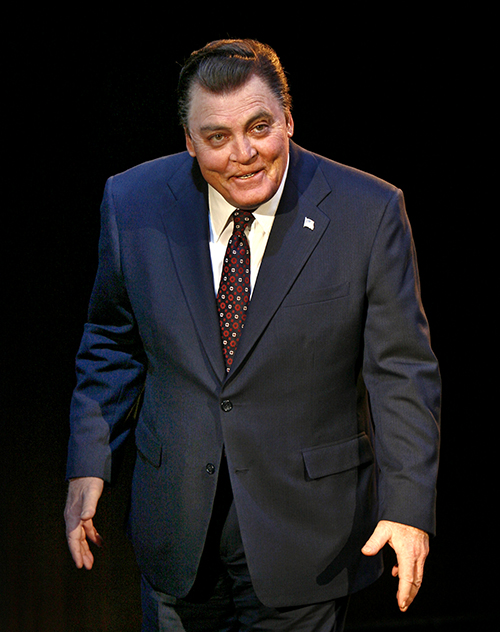
The historical context is that it is nearly three years since Nixon's resignation and subsequent pardon by President Gerald Ford put him forever out of reach of impeachment and prosecution. Frost, a charismatic talk-show host with highly rated shows in Australia and England, proposes 12 interview sessions organized along mutually agreed-upon topics. These will be edited into four consecutive weeknight broadcasts. Nixon will have no editorial control once his words leave his mouth. Frost hopes to gain a more serious reputation in America as the journalist who finally gave a frustrated nation the public inquisition it had been denied. Nixon expects, based on Frost's reputation for puffball celebrity chats, to gain a more sympathetic public image before publication of his memoirs in 1978 -- and make $650,000 for doing it. Morgan captures all this. Allusions to boxing invoke a balanced bout and build suspense as to the outcome before a bullfighting reference subtly shifts the dynamic to an outmatched David in imminent danger of a goring by Goliath. Adding to the sense that Frost is in too deep is his easy distraction by a sudden-but-serious new romance (Roxanna Hope is just right as Caroline Cushing) and regular evenings of wining and dining that culminate in his 150-guest birthday party. Nixon, on the other hand, remains the hardened veteran of courtroom, campaign trail, and showdowns with tough reporters and tougher world leaders such as Breshnev and Mao Tse-tung.
History has portrayed Nixon as a constricted personality, uncomfortable outside his circle of intimates. Keach blows away that image. This immediately protects the production from charges of liberal caricature, and quickly establishes the expectation that anything can happen. Keach's Nixon hits the stage bigger, friendlier and more comfortable in his skin that we expect. Director Michael Grandage and Keach open up the personality, and the show, and avoid doing a Nixon impression as bitter cartoon. As a result, the energy is up and the intermission-less two hours go by quickly (even if there's a woman behind you squeezing a lifetime of throat-clearing into a single evening). After establishing Nixon's room-filling personality as jovial and commanding, in his third scene Keach focuses it with Nixon's resignation-day farewell to his staff. We see Keach willing to find the heart of the man. In one of the show's many speeches we remember verbatim from history, Keach manages to exorcise Nixon from Nixon. This remove lets the play get on with its dramatic agenda, without playing to the kind of easy hiss-the-villain sentiments that in another era would have been inescapable.
In accordance with script and direction, the wonderful Alan Cox provides a lighter Frost than may have actually been the case. To give the play added arc, Morgan and Grandage want Frost to attain more power during the play, and so Cox effortlessly shades him as a dilettante dandy who gets on-canvas propping up from the expert handlers in his corner. In fact, in the generally favorable responses to the play by those handlers and Frost himself, the only knock is that Frost was actually more prepped and combative than depicted onstage. The excellent (though admittedly edited) DVD, which also focuses on the Watergate sections, seems to confirm Frost as a confident, crafty prosecutor quite up to the challenge.
In addition to Hope, there is fine support work by the large ensemble, notably Stephen Rowe as Nixon agent Irving Lazar, Bob Ari as Bob Zelnick and Ted Koch as Jack Brennan. All the environments are effectively contained within Christopher Oram's wide, carpeted, wood-paneled set. High in the upstage panel, a large video screen made up of smaller TV screens plays Jon Driscoll's excellent video – as a single image or a mosaic. Oram also did the tasteful period costumes and Neil Austin lights the stage beautifully to enhance the contrasting tones of darkness and disclosure. Adam Cork's sound design and original music are highlights, from the threatening blast of TV static to the music reminiscent of Isaac Hayes scratch guitar. It helps this respectful dramatization make a 30-year-old confrontation feel contemporary again.
ON THE REAL SIDE Recommended material to complement the experience of 'Frost/Nixon' is the book and/or film All the President's Men. While the play accurately depicts Frost's focus on the Watergate burglary, the President's Men film is an easy way for 21st Century audiences to get a better sense of the 1977 mindset. On stage, Nixon is allowed to dismiss Watergate as a "third-rate burglary." But that was merely the tip of the ice pick. In 1977, viewers of the interviews were fresh from an Academy Awards broadcast in which eight nominations had been laid at the footage of Alan J. Pakula's film. If Watergate is allowed to be left as a mere thwarted burglary attempt, today's audience might think that, since the bugging of the Democratic National Committee did not succeed, no damage was done. In fact, the following exchange, taken directly from the script of the film, is good dialogue to have in mind:
FBI Associate Director W. Mark Felt ("Deep Throat"): Nationwide – my God, they were frightened of Muskie and look who got destroyed – they wanted to run against McGovern, and look who they're running against. They bugged, they followed people, false press leaks, fake letters, they canceled Democratic campaign rallies, they investigated Democratic private lives, they planted spies, stole documents, on and on - don't tell me you think this was all the work of little Don Segretti.
Woodward: And Justice and FBI know all this?
Felt: Yes, yes, everything. There were over fifty people employed by the White House and CREEP to ratfuck--some of what they did is beyond belief.
top of page
FROST/NIXON
by PETER MORGAN
directed by MICHAEL GRANDAGE
AHMANSON THEATRE
March 11-29, 2009
(Opened, rev'd 3/12)
CAST Stacy Keach, Alan Cox, Meghan Andrews, Bob Ari, Antony Hagopian, Peter Hilton, Roxanna Hope, Ted Koch, Tamara-Lovatt-Smith, Stephen Rowe, Brian Sgambati, David Sitler, Noel Velez
PRODUCTION Christopher Oram, set/costumes; Neil Austin, lights; Adam Cork, music/sound; Jon Driscoll, video; Richard Mawbey, wigs/hair; J.P. Elins, stage management
Alan Cox and Roxanna Hope, top; Inset: Stacy Keach
Carol Rosegg
The Undergraduate
John Kolvenbach has succeeded in several key areas with Goldfish, his bittersweet comedy now having its world premiere on the commissioning South Coast Repertory's smaller stage (through April 5). Kolvenbach individuates his characters through dialogue that is crisp, frank, quirky and at times even elegant. His generational story of parental patience flips the familiar dynamic, providing plenty of laughs and messaging along the way without resorting to easy, audience-pleasing answers. Its somber, vanishing point ending is as unflinching as it is sharply focused.
Goldfish, directed then as now by Loreta Greco, was introduced by SCR in a public reading last May. The four-character play is made up of two single-parent, single-teen families. It begins in September as the boy with a widowed dad and girl with a divorced mom are heading off to college. Albert (Tasso Feldman) is more of a parent than his father, Leo (Conor O'Farrell), with whom he is on a first-name basis. Leo has an addiction to grand hopes, based flimsily on long shots and instant recovery, which helps him ignore his responsibility to his son's hopes and dreams. Once at college, bookish, reclusive Albert is hit on by Lucy (Kate Rylie), another adult child of a self-obsessed parent: Margaret (Joan McMurtrey), a bitter alcoholic.
The attraction between Albert and Lucy is the most interesting treasure buried in Kovenbach's story. While the play's obvious theme is the need for young people to navigate away from dead-end parents, an underlying thesis asks why people unwittingly gravitate to people with similar, or the same, histories. It's not for dramaturgical symmetry that the playwright balanced Albert's Leo with Lucy's Mag. It's a reminder that often we enter these relationships bearing the seeds of their destruction. Greco has great sensitivity for these characters. Her toughest challenge is Margaret. Unlike Leo, who is the bigger loser, Margaret has relinquished title to protagonist of her own life story. Instead, she is its victim and the alcolholic, philandering ex-husband with whom she has no contact is in charge. Damaged, and now damaging, she is The Graduate's Mrs. Robinson without the perk of adultery. Like Leo, she claims to love her child more than anything in the world. Unlike him she can rarely offer Lucy an encouraging word. Her rejection of Albert as anything more than a brief fling provides a meaty scene, but Kolvenbach hasn't provided Margaret with more than knee-jerk protectionism. She could use a few more facets if he seeks to further deepen the script. Fortunately, McMurtrey plays it straight, never reaching for the laugh or easy sympathy, and provides the impression of a well-rounded character despite the limitations of the text.
Last May, Goldfish contained a moment of transcendent poignancy. The scene, in which Albert enumerates Lucy's absence of imperfection, is still there. But it did not land, at least at this performance. Last year, with writing as strong as cupped hands, Kolvenbach and Greco's actors made their way through Albert's litany of non-existent complaints, holding the audience's breathless attention and pooled emotions, slowly raising them without spilling a pin drop as he skipped through the phantom list. Whether there is now too much business for Lucy before he begins or something else dilutes the moment, the rhythm is off. If it misses routinely, it's worth getting under the hood to check that timing. It's a grace note as sweet and miraculous as a classic Jimmy Stewart scene.
As Leo, O'Farrell does not play for sympathy, empathy, or villainy. It's another nicely understated approach. As Albert, Feldman must drive the show, which is a tricky assignment given his character's preference to choose care taking over confrontation. Rylie makes Lucy a less overbearing character than was provided in the reading. She offers endearing quirkiness, which works. But the melting of a tougher heart may be what's missing from the list-reading scene. All in all, it's a fine ensemble, working with a director who has been away from this theater too long.
The design team of Myung Hee Cho, set, Alex Jaeger, costumes, and Lonnie Rafael Alcaraz, lights, have created several spare, tailored environments that fit well with the show's directness. Michael Hooker's sound design creates beautiful underscoring, largely with the kind of acoustic guitar one imagines coming from the other bed in the dorm room as a roommate like Albert -- or Benjamin -- dreamily works the frets and wonders where life will lead.
top of page
GOLDFISH
by JOHN KOLVENBACH
directed by LORETTA GRECO
SOUTH COAST REPERTORY
March 15-April 5, 2009
(Opened 3/20, rev'd 3/21m)
CAST Tasso Feldman, Joan McMurtrey, Conor O'Farrell, Kate Rylie
PRODUCTION Myung Hee Cho, set; Alex Jaeger, costumes; Lonnie Rafael Alcaraz, lights; Michael Hooker, sound; John Glore, dramaturg; Julie Haber, stage management
HISTORY World Premiere. Commissioned by South Coast Repertory
Kate Rylie and Tasso Feldman
Henry DiRocco
Theater criticism
For three hours last Friday, artists took the Kirk Douglas stage to wrestle with the question of why American non-profit theater continues to get less ink, income and audience. Then they asked themselves and their audience if there was any way to reverse the trend. First, Mike Daisey offered How Theater Failed America, his one-man, intermission-less two hours of desk-bound monologue. After a brief reception it was time for the tag-team event: Daisey moderating a round-table of L.A. theater luminaries.
Daisey's appearance, part of Center Theatre Group's Douglas-Plus series of short runs (which included the family friendly Darwin), is a special treat for Angelenos, who are hundreds of miles from the nearest theater mentioned in either his bio or that of Jean-Michele Gregory, his director/collaborator/spouse. Here, largely unknown, Daisey is a force of nature that storms in like a sudden squall intent on capsizing theater's neatly strung self-images. If Spaulding Gray did for the theater monologue what Jack Paar did for latenight television, Daisey offers a John Belushi approach that's not ready for prime time. He recalls how his expletive-laced language has raised hackles among theater administrators who did not bother to view his show before booking it. A bullish insider, he upends common complacency without ever rising from his wooden table. His props are the glass from which he occasionally sips water, the kerchief with which he regularly mops his forehead, and handwritten sheets of yellow paper that he does not refer to, but quietly turns to end each section.
After taking his seat in the dark a standing ghost light dims and Meghan Houg's simple light design warms. He launches into his remarkable script: articulate and profane, sensitive and haranguing, street-literate and reverent of language. His first target is his own play title. It's an embarrassment, he admits: a cheap shot, a "bad idea from the get-go." So, he will answer the riddle immediately with a version of "We have met the enemy . . . ." The culprit, he suggests without a hint of humor, is "us" -- those, like him and what felt like the entire audience, who make their living in the theater.
Over more than a half-dozen scenes, Daisey proceeds through personal anecdotes and professional observations drawn from his 35 years on the planet and 20 in the business. With razor-sharp humor he scrapes at the patina of self-emulation that has crusted over too many American non-profit theaters. Like Sidney Greenstreet furiously clawing at the Maltese falcon, he wants to get beyond the self-deception so that, even if its value is diminished, we can have an honest appraisal of where we are, and which way is up. He reduces the theater practice to barebones metaphor: theaters are machines, season of plays are series of slots, and artistic directors are harried mechanics; too many ignore local actors and import "freeze-dried" casts from New York. He knows how it works: from the subscribers to the board members to the mountains and mountains of reception cheese cubes that pass as supplemental salary.
But Daisey does not escape his own grilling: It's also open season on his history, which began in Maine and included theater studies at a "micro-Ivy League" college where he briefly served as a high school drama teacher. As an actor on the regional circuit he has gleaned amazing perspective on how it works. Occasionally, to quote my own previous Artistic Director, he exaggerates to make his point. In the case of the impact of rave reviews, however, his exaggeration is misleading and undercuts his point-making. For instance, newspaper reviews have a much greater influence than raising attendance from 38 percent to 43 percent. However, the element he ignores, and is even more to his point, is the impact of word of mouth. It's hard to know how this plays to non-theater audiences. For insiders it's hilarious and cathartic. Then again, its appeal is that it draws on theater's unique talent for making audiences feel a part of it all: from each company to each performance. We just need more people to fall under the spell. Hopefully Daisey's show will continue to meet both challenges - winning new audiences to theater, and new theaters to his brand of holding the mirror up to the mirror-holders.
Following the round-table (which was held only on March 20), the feeling was that the evening's wrestling match with the issues had been both fun and frustrating. And, since it remains more the former than the latter, no one showed signs of throwing in the towel. If the debate about theater's short-comings and direction for rebounding ended in a draw, then more power to Daisey. Hopefully he'll provide a good draw at many more theaters in Southern California.
top of page
HOW THEATER FAILED AMERICA
created and performed MIKE DAISEY
directed by JEAN-MICHELE GREGORY
KIRK DOUGLAS THEATRE
March 18-21, 2009
CAST Mike Daisey
PRODUCTION Meghan Houg, lights
Mike Daisey
Craig Schwartz
It's Not A Wonderful Life?
In the final analysis, Paul Kikuchi's first script, Ixnay (at East West Players through March 15) manages to promote pride across the diverse spectrum of Asian Americans despite gingerly mining much of its humor from their stereotypes. While Ixnay, a project developed by East West Players, feels predictable and, in its resolution, pat and preachy, Kikuchi does show a promising grasp of his play's comic pulse. Directed by Jeff Liu, this is broad comedy with heart-of-gold intentions.
It starts with a set-up employing the production's best duo. Gedde Watanabe is Tadashi Ozaki, crazed Director of Reincarnation Station #92, and Elizabeth Ho is Reiko, the assistant he regularly reminds was a "fourth-runner-up beauty contestant." Watanabe, with thinning hair standing at electrified attention, is one of, presumably, hundreds ofgatekeepers to "The Next Life," which is represented by a door at the top of a center stage stairway. The plot takes hold when Raymond Kobayashi (Aaron Takahashi) arrives at the station after dying in a car crash. Mysteriously, he has landed at the front of the line without going through the normal process, something we learn when the others whose names have been called fill the waiting room in preparation for re-entry. Kobayashi's advancement seems even stranger when we learn that all these folks have had to work – for as long as four years - to earn their trip back as someone else.
While Raymond declines to return as what he has been - a Japanese American - the others are a mix of those who want to return as a different ethnicity and those happy to pick up where they left off. Dante Basco is a Phillipine-American who has chosen to be the "parachute kid&" of wealthy Chinese-American parents who leave him alone all day with expensive games and cars. Matthew Yang King is a Chinese-American dentist who would love to get back in his same smock before losing a single patient. June Kyoko Lu is a Korean-American who likes her station. However, she harbors a secret identity that will provide the play's convenient deux ex machina to sort things out. Ellen D. Williams is a Samoan, ready to return to the culture she loves. And Matt Braaten is a Caucasian dying to go back as the Japanese-American.
It's Kobayashi's show, but he's generally a passive actor, bringing up the energy when necessary but otherwise blending into the scenery. His challenge is taking a character who must be dour and entrenched, and finding how to keep him active. Watanabe on the other hand seems always to be on, and as a result drives the show. Ultimately, that's fine as he has the answer to the mystery of Raymond's instant turnaround.
Kukuchi is forgiven for keeping his first play paper thin, offering sentimentality in place of character-based emotion. The subject matter is serious, and the Frank Capra approach certainly has potential for depth. It doesn't help that the physical production (aside from Ivy Y. Chou's costumes) seems second rate. Nevertheless, we look forward to Kukuchi's next life on stage with eagerness. His developing skills will certainly be reborn in a worthy new effort.
top of page
IXNAY
by PAUL KIKUCHI
directed by JEFF LIU
EAST WEST PLAYERS
February 18-March 15, 2009
(Opened , rev'd 3/13)
CAST Aaron Takahashi, Gedde Watanabe, Elizabeth Ho, Matthew Yang King, Ellen D. Williams, June Kyoko Lu, Dante Basco, Matt Braaten
PRODUCTION Kurt Boetcher, set; Ivy Y. Chou, costumes; Christopher M. Singleton, lights; Dennis Yen, sound; Darlene Miyakawa, stage management


